So you’ve been diagnosed with oxalate kidney stones and you’re wondering how you can manage this condition through diet. Well, you’ve come to the right place! In this article, we will explore the ins and outs of the Oxalate Kidney Stones Diet, providing valuable insights on what foods to avoid and which ones to indulge in. By the end of this read, you’ll have a solid understanding of how to make dietary choices that can help prevent the formation of these pesky stones and keep your kidney health in check. Let’s jump right in!
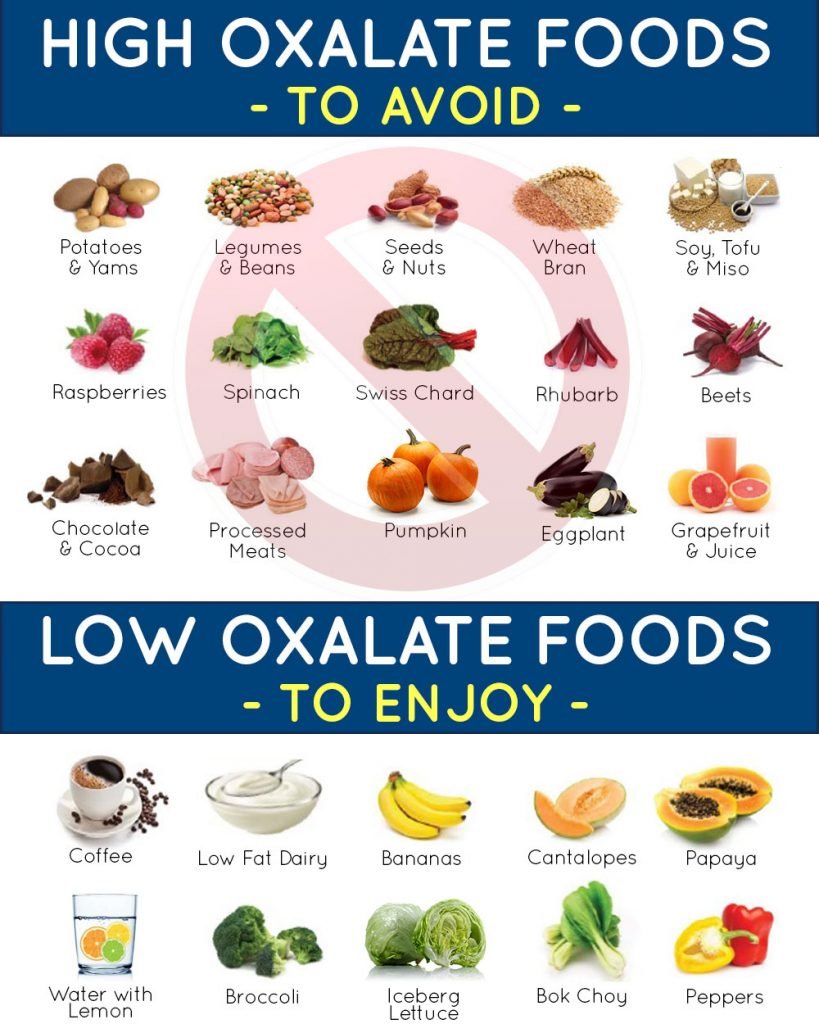
This image is property of kidneycop.com.
Understanding Oxalate Kidney Stones
What are Oxalate Kidney Stones?
Oxalate kidney stones are small, hard deposits of oxalate crystals that form in the kidneys. Oxalate is a naturally occurring substance found in many foods. When there is an excess of oxalate in the urine, it can combine with calcium to form these stones. Oxalate kidney stones can vary in size and shape, ranging from tiny grains to larger stones that can cause severe pain and discomfort.
Causes of Oxalate Kidney Stones
The primary cause of oxalate kidney stones is an increased level of oxalate in the urine. This can occur due to various reasons, including:
- Diet: Consuming a diet high in oxalate-rich foods can increase the concentration of oxalate in the urine, leading to stone formation.
- Medical Conditions: Certain medical conditions, such as inflammatory bowel disease, Crohn’s disease, and intestinal surgery, can impair the absorption of oxalate in the body, resulting in higher levels in the urine.
- Genetics: Some individuals may have a genetic predisposition to producing higher amounts of oxalate in their urine, making them more susceptible to developing kidney stones.
- Dehydration: Insufficient fluid intake can lead to concentrated urine, making it easier for oxalate crystals to form and adhere to the kidney.
Risk Factors for Oxalate Kidney Stones
Several factors can increase the risk of developing oxalate kidney stones, such as:
- Family History: If you have a family history of kidney stones, particularly oxalate stones, you may be more prone to developing them.
- Age and Gender: Men are more likely to develop kidney stones than women, and the risk increases with age.
- Previous History: If you have had kidney stones in the past, you have a higher likelihood of experiencing recurrence.
- Diet: Consuming a diet high in oxalate or low in calcium can contribute to the formation of oxalate stones.
- Obesity: Being overweight or obese increases the risk of kidney stone formation, including oxalate stones.
- Certain Medical Conditions: Medical conditions, such as urinary tract infections and certain types of kidney diseases, can increase the risk of oxalate stone formation.
Diagnosing Oxalate Kidney Stones
Symptoms of Oxalate Kidney Stones
Recognizing the symptoms of oxalate kidney stones is crucial for an accurate diagnosis. Common symptoms include:
- Severe Pain: The most notable symptom of kidney stones is severe pain, often described as a sharp, stabbing sensation in the back or lower abdomen.
- Hematuria: Blood in the urine, also known as hematuria, may be present due to the irritation caused by the stone.
- Frequent Urination: Kidney stones can cause an increased urge to urinate or disrupt normal urination patterns.
- Cloudy or Foul-Smelling Urine: In some cases, kidney stones can result in changes in urine color or odor.
Medical Tests for Diagnosing Oxalate Kidney Stones
To confirm the presence of oxalate kidney stones, various medical tests may be conducted:
- Urine Analysis: A urine sample is analyzed to check for the presence of crystals, blood, or other abnormalities.
- Imaging Tests: X-rays, ultrasound, or CT scans may be performed to visualize the stones and determine their size and location.
- Blood Tests: Blood tests can help assess kidney function and identify any underlying conditions that may contribute to stone formation.
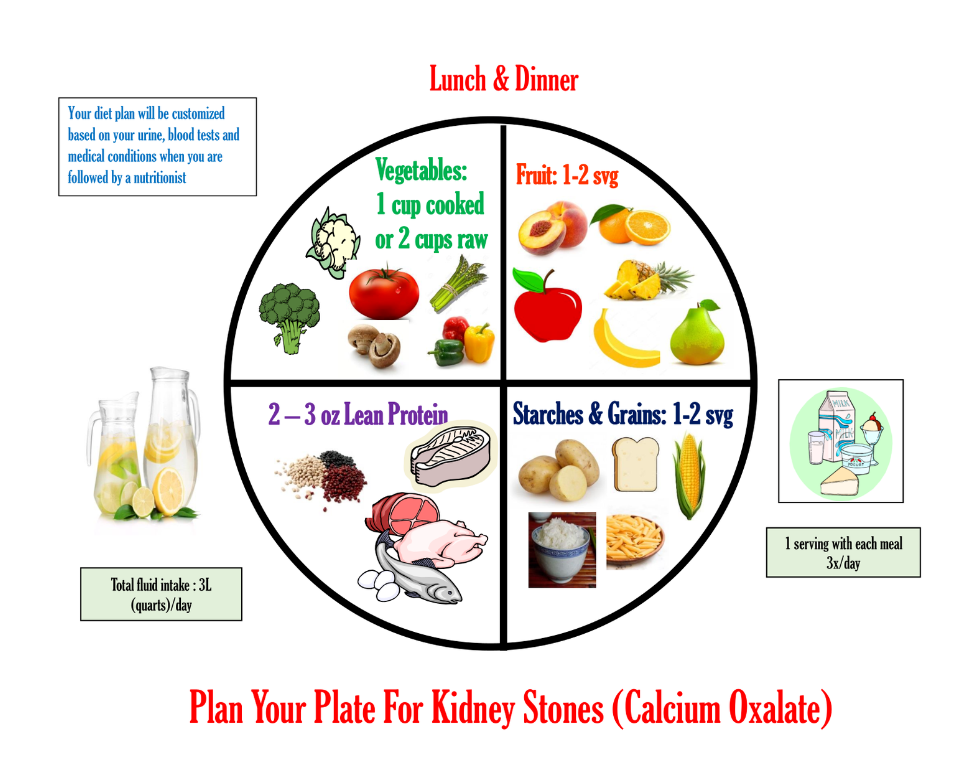
This image is property of www.kidney.org.
Managing Oxalate Kidney Stones with Diet
Importance of Diet in Preventing Oxalate Kidney Stones
Diet plays a crucial role in managing oxalate kidney stones. By making specific dietary modifications, you can help reduce the risk of stone formation and alleviate symptoms. A well-balanced diet can help control oxalate levels in the body and promote overall kidney health.
General Dietary Recommendations for Oxalate Kidney Stones
When it comes to managing oxalate kidney stones, the following dietary recommendations are essential:
- Stay Hydrated: Drinking an adequate amount of fluids, primarily water, throughout the day is crucial in diluting the urine and preventing concentration of oxalate.
- Moderate Oxalate Intake: While it may be challenging to completely avoid oxalate, limiting its intake by avoiding high-oxalate foods can be beneficial.
- Increase Calcium Intake: Contrary to popular belief, increasing calcium intake through dietary sources can help bind oxalate in the digestive system, reducing its absorption into the body.
- Maintain a Healthy Weight: Obesity and weight gain can increase the risk of kidney stones. Following a balanced diet and engaging in regular physical activity can help manage weight and reduce the likelihood of stone formation.
- Limit Sodium Intake: High sodium intake can promote the excretion of calcium in the urine, which may lead to stone formation. It is important to limit processed and high-sodium foods.
- Adequate Protein Intake: Ensure you are consuming an adequate amount of protein from lean sources, such as chicken, fish, and legumes, as excessive protein intake can contribute to stone formation.
- Monitor Sugar Intake: High sugar intake, particularly from sugary beverages, has been associated with an increased risk of kidney stone formation. Limiting the consumption of sugary drinks is recommended.
Low-Oxalate Foods
Fruits and Vegetables
Including a variety of low-oxalate fruits and vegetables in your diet can provide essential nutrients while reducing oxalate intake. Some examples of low-oxalate fruits and vegetables include:
- Apples
- Bananas
- Berries (excluding strawberries)
- Carrots
- Cucumbers
- Grapes
- Peppers
- Watermelon
Grains and Legumes
When it comes to grains and legumes, opting for low-oxalate choices can be beneficial. Consider incorporating the following into your diet:
- Oats
- Rice
- Lentils
- Chickpeas
- Quinoa
Dairy and Meat Products
Dairy and meat products can also be part of a low-oxalate diet. Choose the following options:
- Milk (limit intake if lactose intolerant)
- Cheese (preferably low-fat)
- Yogurt (unsweetened)
- Lean chicken
- Turkey
- Lean beef
Nuts and Seeds
While nuts and seeds are generally higher in oxalate, some options can be included in moderation. Opt for low-oxalate alternatives such as:
- Almonds
- Cashews
- Chia seeds
- Flaxseeds
- Sunflower seeds
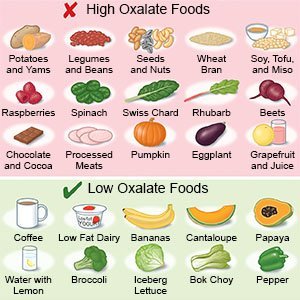
This image is property of www.drugs.com.
High-Oxalate Foods to Limit
Leafy Greens
Certain leafy greens can be high in oxalate and should be consumed in moderation. These include:
- Spinach
- Swiss chard
- Beet greens
- Kale
Beets
Beets are known to contain high levels of oxalate and should be limited in the diet.
Rhubarb
Rhubarb is another high-oxalate food that should be consumed sparingly.
Potatoes
Potatoes, particularly the skin, contain oxalate. It is advisable to peel and cook them before consuming.
Spinach
Spinach is one of the most oxalate-rich vegetables, and its intake should be limited.
Chocolate
While chocolate is a treat for many, it is also high in oxalate. Moderation is key, especially for individuals prone to kidney stones.
Tea and Coffee
Both tea and coffee contain oxalate, so it is necessary to moderate consumption, particularly for those at risk of oxalate kidney stones.
Soy Products
Soy products, including tofu and soy milk, are high in oxalate and should be consumed in moderation.
Nuts
Some nuts, such as almonds, cashews, and peanuts, are higher in oxalate and should be limited in the diet.
Calcium Intake and Oxalate Kidney Stones
Role of Calcium in Oxalate Kidney Stones
Contrary to popular belief, calcium plays an essential role in preventing the formation of oxalate stones. Adequate calcium intake can bind to oxalate in the digestive system, reducing its absorption and transport to the kidneys.
Recommended Calcium Intake for Oxalate Kidney Stones
The recommended daily intake of calcium for adults is around 1000-1200 mg. It is important to obtain calcium from dietary sources, such as low-fat dairy products (milk, cheese, yogurt), fortified plant-based milk, and calcium-rich vegetables.
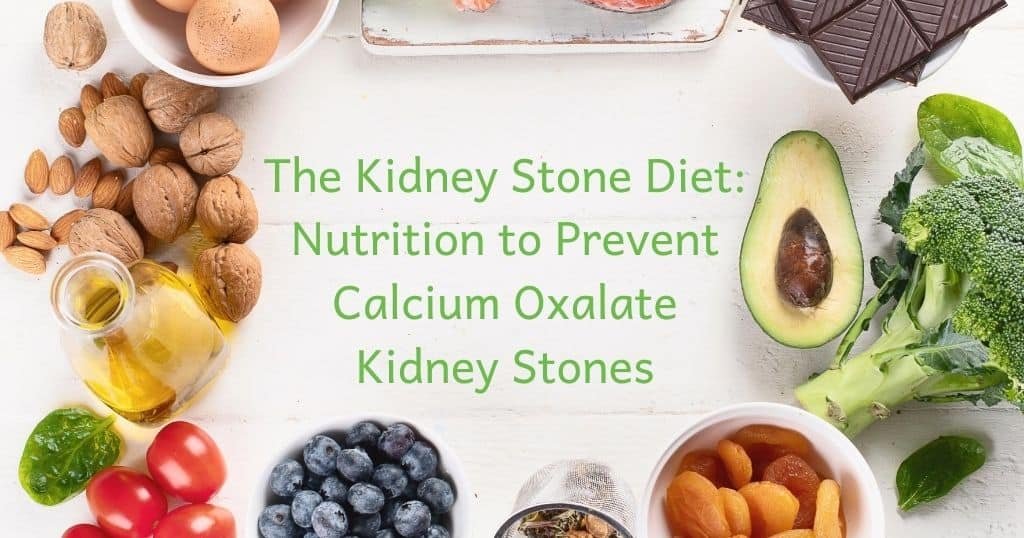
This image is property of www.thekidneydietitian.org.
Fluid Intake and Oxalate Kidney Stones
Importance of Hydration
Maintaining proper hydration is crucial for preventing oxalate kidney stones. Drinking an adequate amount of fluids helps dilute the urine and prevent the concentration of oxalate.
Recommended Fluid Intake
It is generally recommended to drink at least 8 cups (64 ounces) of fluid per day. However, individual fluid needs may vary depending on factors such as activity level, climate, and overall health. Water is the best choice for staying hydrated, but other healthy options include herbal teas and low-sugar beverages.
Tips for an Oxalate Kidney Stones Diet
Meal Planning
Creating a well-balanced meal plan that incorporates low-oxalate foods, adequate calcium intake, and hydration is crucial. Consult with a registered dietitian who specializes in kidney health to tailor a meal plan suited for your specific dietary needs.
Cooking Methods
Certain cooking methods, such as boiling, can reduce the oxalate content in foods. Steaming or microwaving vegetables instead of boiling them may help preserve more of their nutrient content while minimizing oxalate levels.
Portion Control
Practicing portion control is vital, especially for high-oxalate foods. Limiting the portion size of these foods can help reduce oxalate intake while still enjoying them in moderation.
Monitoring Oxalate Intake
Keeping track of your daily oxalate intake and adjusting your diet accordingly can be beneficial. There are various resources available, such as online databases and smartphone applications, that provide information on the oxalate content of different foods.
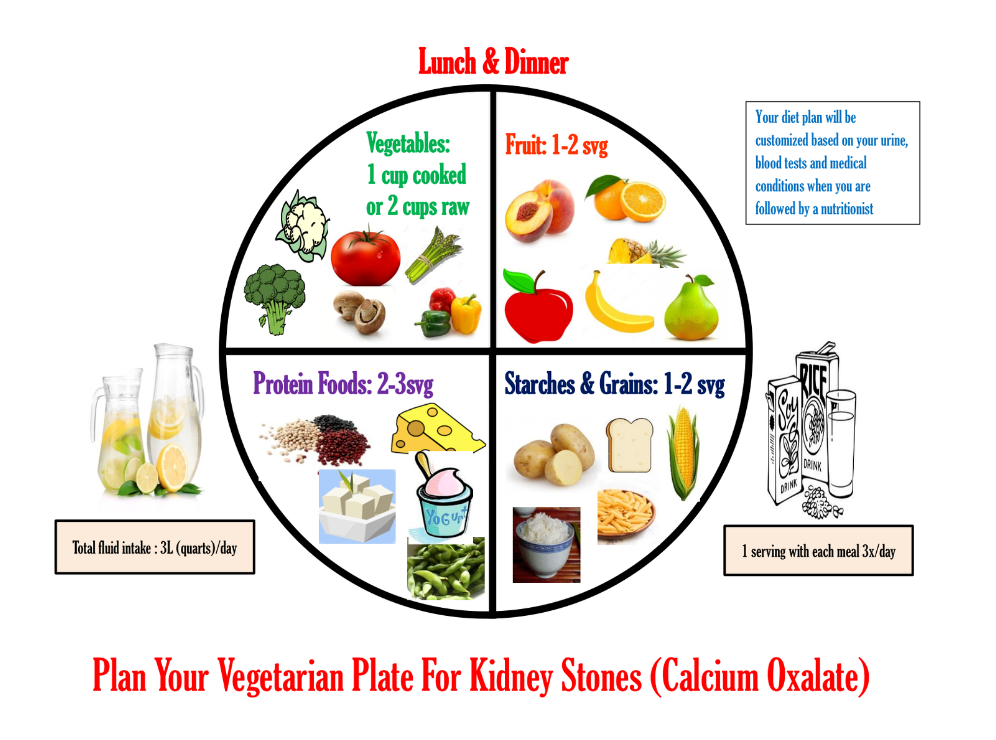
This image is property of www.kidney.org.
Other Dietary Considerations
Sodium Intake
High sodium intake can increase the excretion of calcium in the urine, making individuals more susceptible to developing kidney stones. It is important to limit the consumption of processed and high-sodium foods.
Protein Intake
Although protein is an essential nutrient, excessive protein intake can contribute to stone formation. Ensure you are consuming an adequate amount of protein, ideally from lean sources like chicken, fish, and legumes.
Sugar and Oxalate Kidney Stones
High sugar intake, particularly from sugary beverages, has been associated with an increased risk of kidney stone formation. Limiting the consumption of sugary drinks is recommended to maintain overall kidney health.
Lifestyle Changes for Preventing Oxalate Kidney Stones
Maintaining a Healthy Weight
Maintaining a healthy weight is essential in preventing kidney stones, including oxalate stones. Obesity and weight gain increase the risk of stone formation, so adopting a healthy diet and engaging in regular physical activity can help manage weight and reduce the likelihood of stone recurrence.
Regular Physical Activity
Regular physical activity is beneficial not only for weight management but also for overall health. Engaging in moderate-intensity exercise, such as brisk walking or cycling, for at least 150 minutes per week can help promote kidney health and reduce the risk of stone formation.
Limiting Alcohol and Caffeine Intake
Excessive alcohol consumption and high caffeine intake can contribute to dehydration, which can increase the risk of kidney stone formation. It is advisable to limit alcohol and caffeine intake as part of a healthy lifestyle for preventing oxalate kidney stones.
By understanding the causes, diagnosing methods, and managing oxalate kidney stones with a well-balanced diet and appropriate lifestyle changes, you can take proactive steps to promote kidney health and reduce the risk of stone formation. Consult with a healthcare professional or registered dietitian for personalized advice and guidance in managing oxalate kidney stones.

